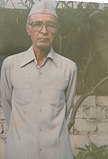Baharul Islam
Justice Justice Baharul Islam | |
|---|---|
 | |
| Member of Parliament, Rajya Sabha | |
| In office 3 April 1962 – 20 January 1972 | |
| Justice of the Supreme Court of India | |
| In office 4 December 1980 – 12 January 1983 | |
| Member of Parliament, Rajya Sabha | |
| In office 15 June 1983 – 14 June 1989 [1] | |
| Personal details | |
| Born | 1 March 1918 |
| Died | 5 February 1993 (aged 74) |
| Nationality | Indian |
| Political party | Indian National Congress[2] |
| Children | Mubina Islam, Nazrul Islam, Rumi Islam, Ruby Islam, Inamul Islam |
| Alma mater | Faculty of Law, Aligarh Muslim University |
Justice Baharul Islam (1918-1993) was an Indian politician and judge of the Supreme Court of India.[3][4] He was elected to the Rajya Sabha, upper house of the Parliament of India as a member of the Indian National Congress and in 1972 he resigned from the Rajya Sabha to become a judge in the Gauhati High Court after he retired as chief Justice of the Gauhati High Court he was recalled and made a Judge of the Supreme court. He gave a Judgement in the case absolving the then Congress Bihar Chief Minister Jagannath Mishra in the urban cooperative bank scandal[5] and later resigned from the Supreme court to contest elections as a Congress party candidate and was elected to the Rajya Sabha.[6][7][8][2]
Early life[edit]
Born at village Udiana PS Rangia in district of Kamrup, Assam, and educated at Gurdon High School.
Education[edit]
Educated at Gurdon High School, Nalbari, District Kamrup, Assam, Cotton College, Gauhati and Aligarh Muslim University.
Career[edit]
He enrolled as an Advocate of the Assam High Court in 1951 and as an Advocate of the Supreme Court in 1958. He joined the Indian National Congress party in 1956 [2] and was elected to the Rajya Sabha in 1962 and for a second term in 1968 as a member of the party. He resigned from the Rajya Sabha in 1972 and was appointed Judge of the then Assam and Nagaland High Court (Now Gauhati High Court) on 20 January 1972 . He was appointed acting Chief Justice of the Gauhati High Court on 11.3.1979 and became the Chief Justice of the Gauhati High Court on 7 July 1979, he retired on 1 March 1980. He was appointed to the Supreme Court of India on 4 December 1980 which was unprecedented as a retired judge is normally not appointed to the Supreme court and further he could retire after only fifteen months. He resigned from the Supreme Court on 12 January 1983 to contest from Barpeta, Assam to the Lok Sabha as a Congress party candidate [7][9] however as elections in Assam were postponed in the 1984 Indian general election, he was elected as a Rajya Sabha .[6][3]
He was a member of, but did not serve as the president of the Gauhati High Court Bar Association.[10]
Committees[edit]
In 1987 Justice Baharul Islam committee was appointed to draft the legislation emphasizing the rights, equal opportunities, and full participation of disabled persons.[11]
References[edit]
- ↑ "Rajya Sabsha Members Biographical Sketches 1952–2003" (PDF). Rajya Sabha. Retrieved 17 March 2020.
- ↑ 2.0 2.1 2.2 "Removal motion against CJI a remarkable piece of skullduggery". Dhananjay Mahapatra. The Times of India. 23 April 2018. Retrieved 17 March 2020.
- ↑ 3.0 3.1 "Former Judges: Baharul Islam". Supreme Court of India. Archived from the original on 17 October 2014. Retrieved 20 September 2015.
- ↑ Kalbag, Chaitanya (31 January 1983). "Ends of Justice". India Today. Archived from the original on 22 September 2015.
- ↑ "Collegium 2.0". Sudhansu Ranjan. Asian Age. 3 November 2015. Retrieved 17 March 2020.
- ↑ 6.0 6.1 "Justice Baharul Islam tenders his resignation from SC Bench to President Zail Singh". Chaitanya Kalbag. India Today. 31 July 1983. Retrieved 17 March 2020.
- ↑ 7.0 7.1 M.V. Pylee (1998). Emerging Trends of Indian Polity. Regency Publications. pp. 50–. ISBN 978-81-86030-75-2.
- ↑ Abhinav Chandrachud (29 May 2018). Supreme Whispers: Conversations with Judges of the Supreme Court of India 1980-89. Penguin Random House India Private Limited. pp. 183–. ISBN 978-93-5305-021-4.
- ↑ James Manor (1994). Nehru to the Nineties: The Changing Office of Prime Minister in India. C. Hurst & Co. Publishers. pp. 112–. ISBN 978-1-85065-180-2. Retrieved 17 March 2020.
- ↑ "About Us: Past Presidents of the Association". Gauhati High Court Bar Association. Archived from the original on 4 March 2016. Retrieved 20 September 2015.
- ↑ Bhambhani, Meenu (2005). "Disability Policy: India". In Albrecht, Gary L. (ed.). Encyclopedia of Disability, volume 1. Thousand Oaks, California: Sage Publications. pp. 465–467, page 467. ISBN 978-1-4522-6520-9.
